History of Oryol
16th Century
Foundation
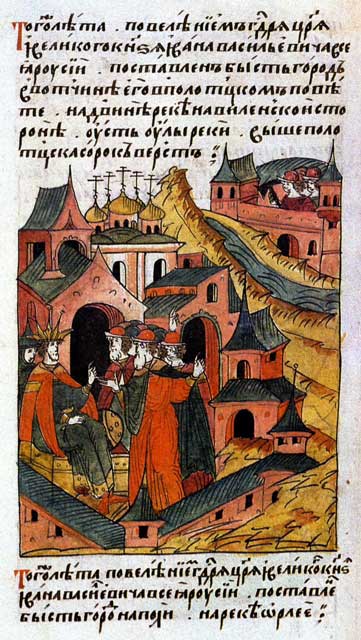 Oryol was founded as a fortress to protect Russia's western borders in 1566 on the orders of Tsar Ivan the Terrible. However although no written evidence exists, archaeological evidence suggests that a fortress had previously existed here and was probably abandoned when the area fell to the Grand Duchy of Lithuania in the 14th century. The city is named after the River Oryol, which has since been renamed the Orlik. Oryol is the Russian for eagle and orlik - eaglet.
Oryol was founded as a fortress to protect Russia's western borders in 1566 on the orders of Tsar Ivan the Terrible. However although no written evidence exists, archaeological evidence suggests that a fortress had previously existed here and was probably abandoned when the area fell to the Grand Duchy of Lithuania in the 14th century. The city is named after the River Oryol, which has since been renamed the Orlik. Oryol is the Russian for eagle and orlik - eaglet.
17th Century
Times of Troubles
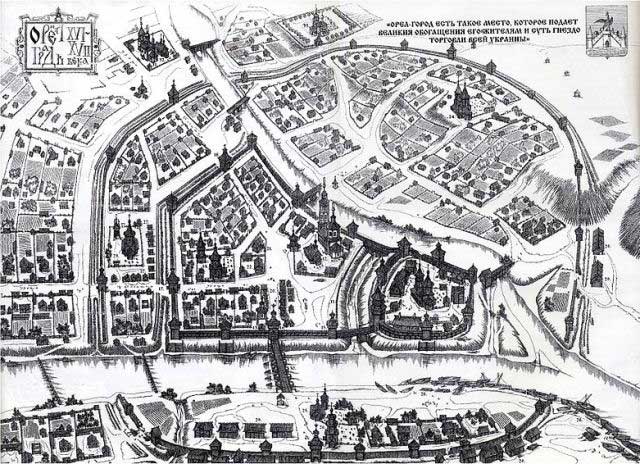 Oryol played a significant role during the Times of Troubles and suffered as a result of this. In May 1605 Oryol was captured by the forces of the First False Dmitri. Later in August 1606 the city's population and the garrison at the fortress gave their support to the rebellion lead by Ivan Bolotnikov. In the winter of 1607 and 1608 the Second False Dmitri set up residence in Oryol. Finally the city was sacked in 1611 by Polish Interventionists and then almost completely destroyed during the raid of Aleksandr Lisowski in 1615. The city was only re-established in 1634 and for the rest of the century served as a defensive post against Crimean Tatar raids.
Oryol played a significant role during the Times of Troubles and suffered as a result of this. In May 1605 Oryol was captured by the forces of the First False Dmitri. Later in August 1606 the city's population and the garrison at the fortress gave their support to the rebellion lead by Ivan Bolotnikov. In the winter of 1607 and 1608 the Second False Dmitri set up residence in Oryol. Finally the city was sacked in 1611 by Polish Interventionists and then almost completely destroyed during the raid of Aleksandr Lisowski in 1615. The city was only re-established in 1634 and for the rest of the century served as a defensive post against Crimean Tatar raids.
18th Century
Administrative Reform
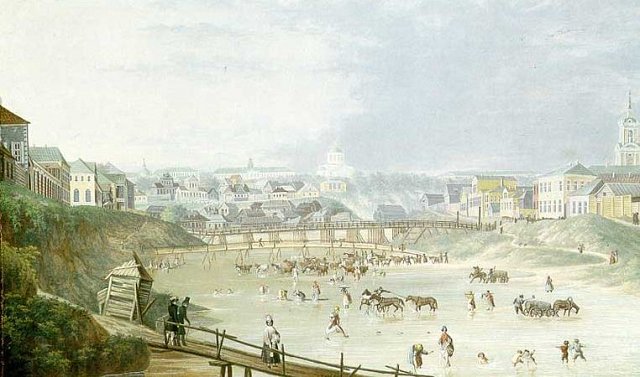 By the 18th century Oryol's defensive significance had subsided and its fortress was demolished in 1702. Instead Oryol became an important centre for bread production, aided by the trade route along the River Oka. In 1708 Oryol became part of the Kiev Governorate. In 1719 the city became the centre of the Oryol Province within the Kiev Governorate until 1727 when the province was transferred to the Belgorod Governorate. In 1778 Oryol became the centre of the Oryol Viceroyalty and then the Oryol Governorate in 1796. Oryol's coat of arms was adopted in 1781 and depicts a black eagle perched on top of the gates of a white city.
By the 18th century Oryol's defensive significance had subsided and its fortress was demolished in 1702. Instead Oryol became an important centre for bread production, aided by the trade route along the River Oka. In 1708 Oryol became part of the Kiev Governorate. In 1719 the city became the centre of the Oryol Province within the Kiev Governorate until 1727 when the province was transferred to the Belgorod Governorate. In 1778 Oryol became the centre of the Oryol Viceroyalty and then the Oryol Governorate in 1796. Oryol's coat of arms was adopted in 1781 and depicts a black eagle perched on top of the gates of a white city.
19th Century
Literary Connections
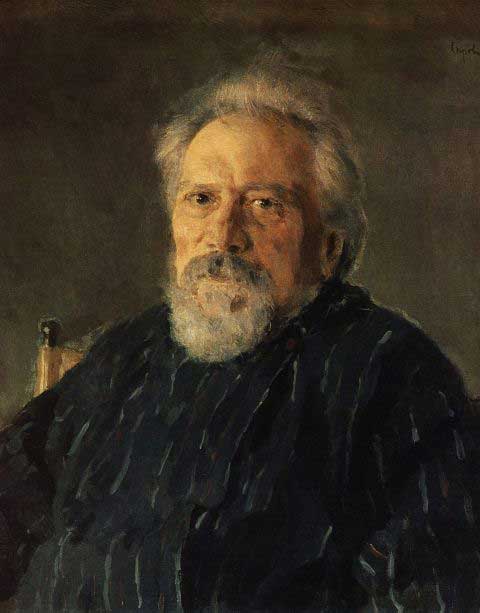 The 19th century saw Oryol becoming connected with several of Russia's greatest literary personalities. Ivan Turgenev, one of Russia's most famous writers, was born in Oryol in 1818 and had an estate in nearby Mtsensk. The author Nikolai Leskov was born in 1831 in the village of Gorokhovo in what was then the Oryol Governorate and spent his childhood in Oryol. The playwright and novelist Leonid Andreev was born in Oryol in 1871. In 1881 Boris Zaitsev was born in Oryol who went on to become a well-known prose writer and dramatist. In 1889 the Noble Prize winning author Ivan Bunin moved to Oryol and worked there writing for a local newspaper until 1892.
The 19th century saw Oryol becoming connected with several of Russia's greatest literary personalities. Ivan Turgenev, one of Russia's most famous writers, was born in Oryol in 1818 and had an estate in nearby Mtsensk. The author Nikolai Leskov was born in 1831 in the village of Gorokhovo in what was then the Oryol Governorate and spent his childhood in Oryol. The playwright and novelist Leonid Andreev was born in Oryol in 1871. In 1881 Boris Zaitsev was born in Oryol who went on to become a well-known prose writer and dramatist. In 1889 the Noble Prize winning author Ivan Bunin moved to Oryol and worked there writing for a local newspaper until 1892.
20th Century
Soviet Power
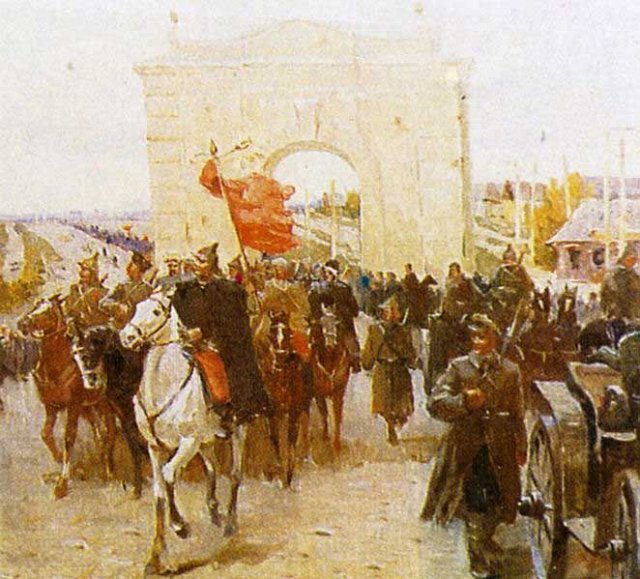 After the October Revolution of 1917, Soviet power was eventually established in Oryol. On 13 October 1919 during the Russian Civil War the Kornilovsky Regiment of the Volunteer Army captured Oryol from the Reds. From Oryol the Volunteer Army captured Mtsensk and then launched an attack on Tula. However the Red Army managed to regain control during the Oryol-Kromy Operation and they had recaptured Oryol by the 20 October 1919, although the Volunteer Army did manage to escape. In 1928 the city became part of the Central Black Earth Region and then part of the Kursk Region in 1934. Finally in 1937 the city became the administrative centre of the newly-established Oryol Region.
After the October Revolution of 1917, Soviet power was eventually established in Oryol. On 13 October 1919 during the Russian Civil War the Kornilovsky Regiment of the Volunteer Army captured Oryol from the Reds. From Oryol the Volunteer Army captured Mtsensk and then launched an attack on Tula. However the Red Army managed to regain control during the Oryol-Kromy Operation and they had recaptured Oryol by the 20 October 1919, although the Volunteer Army did manage to escape. In 1928 the city became part of the Central Black Earth Region and then part of the Kursk Region in 1934. Finally in 1937 the city became the administrative centre of the newly-established Oryol Region.
Second World War
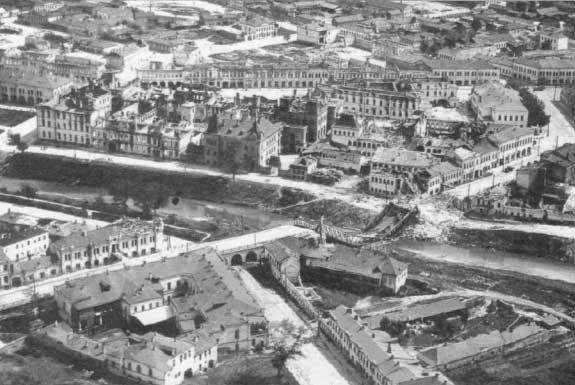 In 1941 preparations began evacuating the city as the Wehrmacht approached and many industries were dismantled and transported east. Precautions were also taken regarding Oryol's political prisoners: 157 of them who were being held in the notorious Oryol Central Prison were executed in Medvedevsky Forest by the NKVD. On 3 October 1941 the city fell to the Nazis. The city was only liberated by the Red Army during the Battle of the Kursk Salient on 5 August 1943. During the Nazi occupation the city suffered greatly, the Oryol Central Prison was turned into a concentration camp for POWs and most of the city's buildings were destroyed. Along with Belgorod, Oryol was the first major city to be liberated by the Red Army and fireworks were let of in celebration - thereby leading to both cities being known as a City of the First Fireworks. In 2007 Oryol was awarded the title of City of Military Glory for its role during the Second World War.
In 1941 preparations began evacuating the city as the Wehrmacht approached and many industries were dismantled and transported east. Precautions were also taken regarding Oryol's political prisoners: 157 of them who were being held in the notorious Oryol Central Prison were executed in Medvedevsky Forest by the NKVD. On 3 October 1941 the city fell to the Nazis. The city was only liberated by the Red Army during the Battle of the Kursk Salient on 5 August 1943. During the Nazi occupation the city suffered greatly, the Oryol Central Prison was turned into a concentration camp for POWs and most of the city's buildings were destroyed. Along with Belgorod, Oryol was the first major city to be liberated by the Red Army and fireworks were let of in celebration - thereby leading to both cities being known as a City of the First Fireworks. In 2007 Oryol was awarded the title of City of Military Glory for its role during the Second World War.

 History
History